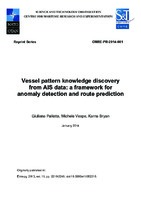| dc.contributor.author | Pallotta, Giuliana | |
| dc.contributor.author | Vespe, Michele | |
| dc.contributor.author | Bryan, Karna | |
| dc.date.accessioned | 2018-10-11T14:09:46Z | |
| dc.date.available | 2018-10-11T14:09:46Z | |
| dc.date.issued | 2014/01 | |
| dc.identifier | 47925 | |
| dc.identifier.govdoc | CMRE-PR-2014-001 | |
| dc.identifier.uri | http://hdl.handle.net/20.500.12489/677 | |
| dc.description.abstract | Understanding maritime traffic patterns is key to Maritime Situational Awareness applications, in particular, to classify and predict activities. Facilitated by the recent build-up of terrestrial networks and satellite constellations of Automatic Identification System (AIS) receivers, ship movement information is becoming increasingly available, both in coastal areas and open waters. The resulting amount of information is increasingly overwhelming to human operators, requiring the aid of automatic processing to synthesize the behaviors of interest in a clear and effective way. Although AIS data are only legally required for larger vessels, their use is growing, and they can be effectively used to infer different levels of contextual information, from the characterization of ports and off-shore platforms to spatial and temporal distributions of routes. An unsupervised and incremental learning approach to the extraction of maritime movement patterns is presented here to convert from raw data to information supporting decisions. This is a basis for automatically detecting anomalies and projecting current trajectories and patterns into the future. The proposed methodology, called TREAD (Traffic Route Extraction and Anomaly Detection) was developed for different levels of intermittency (i.e., sensor coverage and performance), persistence (i.e., time lag between subsequent observations) and data sources (i.e., ground-based and space-based receivers). | |
| dc.format | 28 p. : ill. ; digital (PDF file) | |
| dc.language | English | |
| dc.publisher | CMRE | |
| dc.source | In: Entropy, 2013, vol. 15, pp. 2218-2245; doi:10.3390/e15062218. | |
| dc.subject | Maritime situational awareness | |
| dc.subject | Shipping lanes | |
| dc.subject | Maritime route extraction | |
| dc.subject | Maritime route prediction | |
| dc.subject | TREAD (Traffic Route Extraction and Anomaly Detection) | |
| dc.subject | Machine learning - Mathematical models | |
| dc.subject | Automatic Identification Systems (AIS) | |
| dc.title | Vessel pattern knowledge discovery from AIS data: a framework for anomaly detection and route prediction | |
| dc.type | Reprint (PR) | |
| dc.type | Papers and Articles | |
